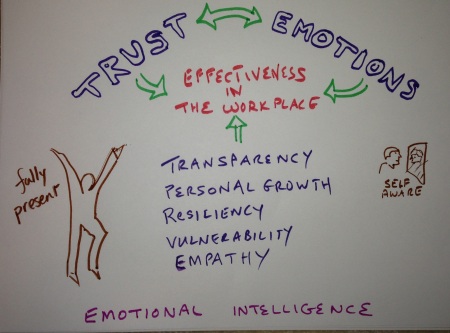Trust and Emotions in the Workplace
I am glad; respecting people’s time, wanting to be concise, wanting to keep it simple.
I’m in.
(I check in this way to make myself vulnerable and to gain your trust)
Why Trust?
Trust is the real fuel of a productive team. Processes may be useful to organize complex knowledge work, but without trust, even the cleverest process will suffer. Knowledge work involves creativity which involves taking risks (including the risk of making mistakes).
Great teamwork requires trust and vulnerability among team members. How do team members get to this state?
What if they started with a clean slate every day or at the start of meetings- by sharing the current state of their emotions?
When I am able to do this and be welcomed without comment, I am ready to tackle my day, my meeting or my personal interactions so much more openly. If others do the same, even more so.
Why Emotions?
People can connect to my humanity (and me to theirs). Explicitly hearing someone’s feelings of sadness, anger, joy helps me trust a person faster, knowing him or her as a full, rich human, not just as an actor functioning in a process. Vulnerability, the willing to let ourselves be more fully seen is a great way to create trust.
Think about your current environment:
- What emotions do you notice people are hiding in your workplace?
- When is it good to suppress feelings and when not?
- How might it feel to work in an environment where your colleagues welcome your emotions without judging you?
- How would it feel to share and have others share observations, feelings, needs and requests instead of blaming, placating, and coping in incongruent ways?
- How might bonds of trust between colleagues improve if you knew more about their past influences and their future ambitions?

March 28, 2013 at 6:29 am
Excellent post and drawing! I think it’s important to find the balance of showing emotions vs supressing them. It’s something the team and management has to learn. The better they get at it, the more everyone can open up without fear.
LikeLike
March 28, 2013 at 9:01 am
Hi Philippe,
Thanks! I didn’t go into detail about levels of emotion. You can also remove yourself from a situation in which you are too volatile emotionally to be contributing well by checking out. Instead of suppressing volatile emotions, or acting them out, you acknowledge your need for space and remove yourself from a situation like that. I think this is a balanced way to deal openly with what’s going on.
By the way, I just came across an article: http://bit.ly/vGNnW4 about organizational change and emotions.
LikeLike
March 28, 2013 at 1:17 pm
Sounds like an excellent way to balance dealing with emotions. Thank’s for the link.
LikeLike
March 30, 2013 at 1:09 am
I feel happy that you chose to write about trust and the role of emotions in the workplace. It meets my need to be more open, and have more folks exposed to these ideas.
I felt sad you chose to mention process, because I find the very word (and concept) undermines trust and suppresses expression of eg emotions.
I feel angry and frustrated when people ask “How are you?” As a matter of rote, with not time or inclination or expectation of hearing a truthful and considered reply.
I feel delighted that you requested me to make a comment, and hope this goes at least some way to meeting your need(s) in that regard – even though I’m only guessing at what those needs might be.
– Bob
LikeLike
March 30, 2013 at 12:39 pm
Thanks Bob! I had chopped out a whole middle section in which I had wanted to introduce the benefits of using NVC for disclosure of observations, feelings, needs, and requests. Opted to do it in a separate post later.
LikeLike
March 30, 2013 at 9:58 am
Hello Andrea!
I am glad to read your pertinent post about emotions. Yesterday I had lunch with a team of two persons to whom I had to present a project. Incidentally, the youngest lady, about 25, gave an account of her discovering how her colleagues, even the oldest, were spending a lot of their energy for concealing, camouflaging, and disguising their emotions. She added she thought at first she was the only one not showing her lack of confidence for instance.
I answered that she was really smart for observing such phenomenons right at the beginning of her career.
Though, this is difficult to recognize we can have emotions on our working place, then to put a name on an emotion in particular. This is a poet’s task after all! Maybe colors are more accurate for expressing emotions as well! I remember when I was living in Paris, the underground tickets’ retailer would have written, each morning, one or two verses of a poem, on a black board behind his desk, for revealing what was his emotion of the day, or a subtle hint of mood in the air…
But he was an employee-poet, kind of rare specimen.
We might consent to what our inner selves tell — emotions are useful! Such consideration of our feelings can become a statement vs hidden emotions. Then we can confront it, as a relevant question, to others’ acceptance.
LikeLike
March 30, 2013 at 10:09 am
Thanks, Catherine! Bringing one’s entire self to work rather than segmenting one’s existence into work vs personal life takes courage. Artists do this quite naturally; knowledge workers and managers much less so!
Love the story of the ticket retailer-poet!
LikeLike